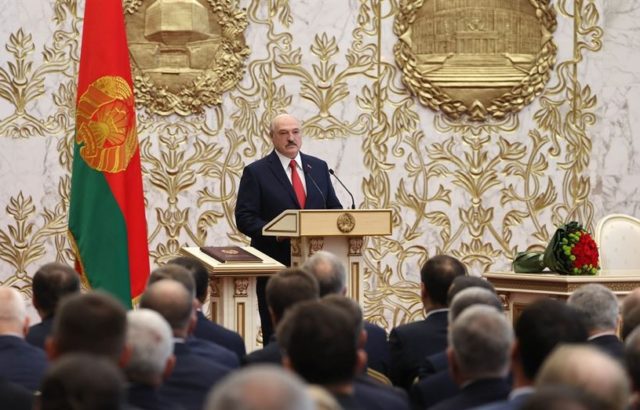
Belarusian President Holds Surprise Inauguration
By:

Today, September 23, Alyaksandr Lukashenka was officially inaugurated to his sixth consecutive term as president of Belarus. The ceremony took place at the Palace of Independence with about 700 guests representing the executive and legislative branches of the government, regional administrations, the government-run media, as well as the military, science establishment, popular culture and sports (Belta, September 23).
The event’s most unusual aspect is that it was not pre-announced. Likewise, no foreign guests were reported—even the Russian ambassador was not there. When the inauguration was already in full swing, the usually well-informed Lenta.ru wrote, with reference to Tut.by, that “near the Palace of Independence in Minsk, a crowd of people in suits, as well as buses and trucks with military personnel, including representatives of the guard of honor, were noticed. Most likely, the inauguration rehearsal is taking place at the Palace” (Lenta.ru, September 23).
Yury Drakokhrust of Radio Liberty believes that covering the event with a shroud of mystery was needed to prevent groups of protesters from gathering close to the venue with their white-red-white flags and shouting their favorite slogan: “Ukhodi” (“Go away”). That situation would have led to multiple pictures across world-wide media besmirching the inauguration (Tut.by, September 23).
According to the Belarusian constitution, the event had to take place within two months from the election—that is, on or before October 9. Lukashenka took the oath of office in Belarusian and then delivered a speech in Russian. “We did not just elect the president of the country,” he declared, continuing, “We defended our values, our peaceful life, sovereignty and independence. And in this regard, we still have a lot to do.” Other essential parts of his speech concerned his interpretation of Belarus’s acquisition of statehood and of the unusually tenacious protest movement that arose immediately after the August 9 election, Belarus’s social policies, economic development, work on the new constitution, and even Belarus’s peace-keeping functions that Lukashenka vowed to preserve (Belta, September 23).
“Once, by God’s providence, the people of Belarus easily and, frankly, unexpectedly gained their independence,” acknowledged Lukashenka. “And we have long taken it for granted. Sometimes we did not appreciate it. Today, having suffered so much for this victory [i.e., his electoral victory and cracking down on protests], we have risen to a new level of self-awareness. Having cooled down from the fever of electoral battles, we saw how our entire nation was growing up. And even if Belarus is a very young independent state by world standards, the Belarusians as a nation are no longer children, we are a grown-up people.” Lukashenka attributed protests to Belarusian statehood being subjected to an unprecedented challenge, the challenge of repeatedly tested and seemingly reliable “technologies of destruction of independent states. But we were among the very few—even, perhaps, the only ones—where the color revolution failed,” declared Lukashenka. And it failed allegedly because Belarusians “did not want to lose their country.”
So just as protesters perceive themselves as representing all of Belarusian society, Lukashenka believes he speaks for the many Belarusians who either rely on the continuation of his power vertical or simply chose to stay away from the demonstrations. His speech conspicuously did not even hint at any kind of willingness to negotiate with the “other” Belarus.
Lukashenka maintained that the government’s emphasis on social policies, like support for retirees, families with multiple children, and vulnerable social strata, will be retained. Considering economic innovations, he expressed hope that “wise investors who think in terms of cross-border commerce will appreciate our efforts to create an attractive business environment.” He also acknowledged the ongoing work on the new constitution and underscored that a strong power vertical is the only guarantee of Belarus’s survival as an independent state. Finally, he expressed certainty that Belarus will cope with its problems without foreign interference.
Multiple international comments on the inauguration will surely invoke Lukashenka’s limited legitimacy at the helm of power in view of the dominant opinion that his elections was compromised. Legitimacy, however, is a tricky subject. If and when the newly promoted United States ambassador to Belarus, Julie Fisher, receives the endorsement of the full US Senate, as seems likely, she will have to present her credentials to Alyaksandr Lukashenka.



